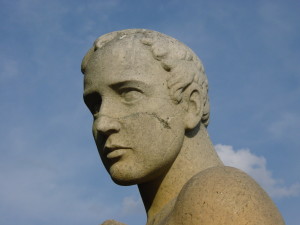
Historically, battle scars were a marker of a true warrior. A man’s well-earned scars carried stories of his battles and feats. What about today? With our emphasis on perfection, we risk losing the value of scars that have been honorably won.
“People want to see Christ followers have scars where they have wounds”. – Steve Saint
Why do we “Christ followers” fall into the trap of believing we must have it all together (whatever that means!) and cannot allow others to see the scars that result from our struggles? It’s the stories behind our healed scars, whether relational, emotional, spiritual or otherwise, that reveal the glory of God’s power. It’s the power of our being real.
Scripture gives us examples of real people being real.
Peter was impetuous and brash. He had a tongue that worked faster than his brain. He was loyal to a fault until the heat became too much and then he denied the greatest Friend he’d ever had.
Paul grew up as a highly intelligent and well-educated religious snob who opposed the cause of Christ and was involved with the imprisonment and martyrdom of believers, including Stephen.
Jonathan, my personal Old Testament hero, had an insane father who tried to murder Jonathan’s best friend and even considered putting Jonathan himself to death! Who would expect much from the son of such a mixed up father?
Why is God so honest in describing the faults and failures of His servants?
Is it because He knows we need to see our own wounds in the light of their scars?
We can be bold and outspoken with our loyalty one moment, and then turn on the ones we claim to love, the next. Just like Peter who denied Jesus, and then weeks later preached a sermon that resulted in thousands coming to the Lord.
We have skeletons in our past that threaten to drag us down in shame. Like Paul, the self-described worse of sinners, (1 Timothy 1:15) who went on to author the majority of the New Testament books and to take the gospel to much of the known world of his time.
We grew up in broken and dysfunctional families that cause us to question if we have anything to offer the world. Then we meet Jonathan, son of a crazy man, and see one of the greatest examples of friendship that one man could offer another.
The scars of the great men (and women) of the faith remind us that God heals wounds, and uses the scarred.
Will we allow God to show our scars to tell our stories, so that more wounded find the same healing we are experiencing?
“We need to begin to live like the compassionate warriors, the wounded healers, that God wants us to be.”
-Cecil Murphey, Not Quite Healed




Leave a Reply